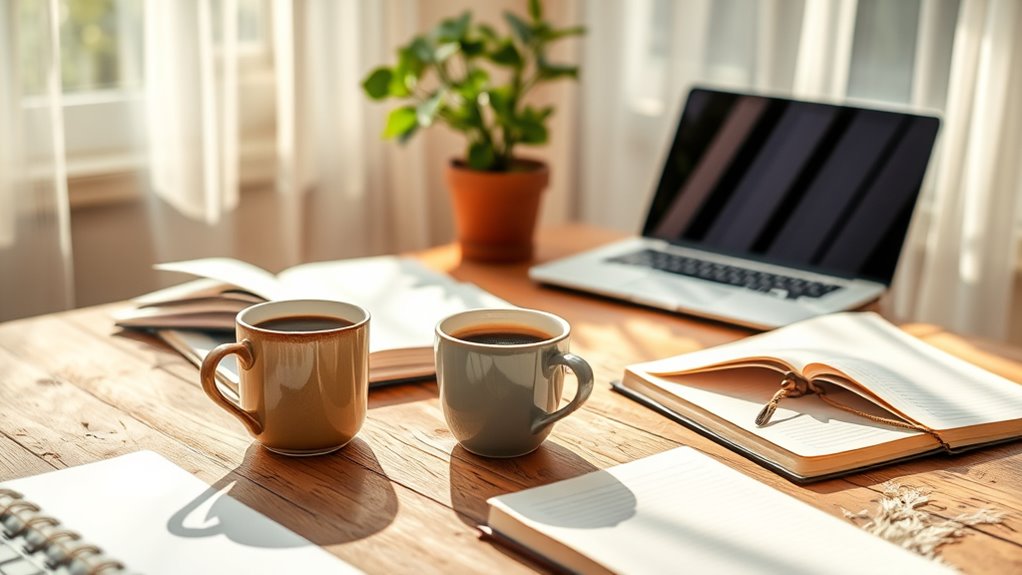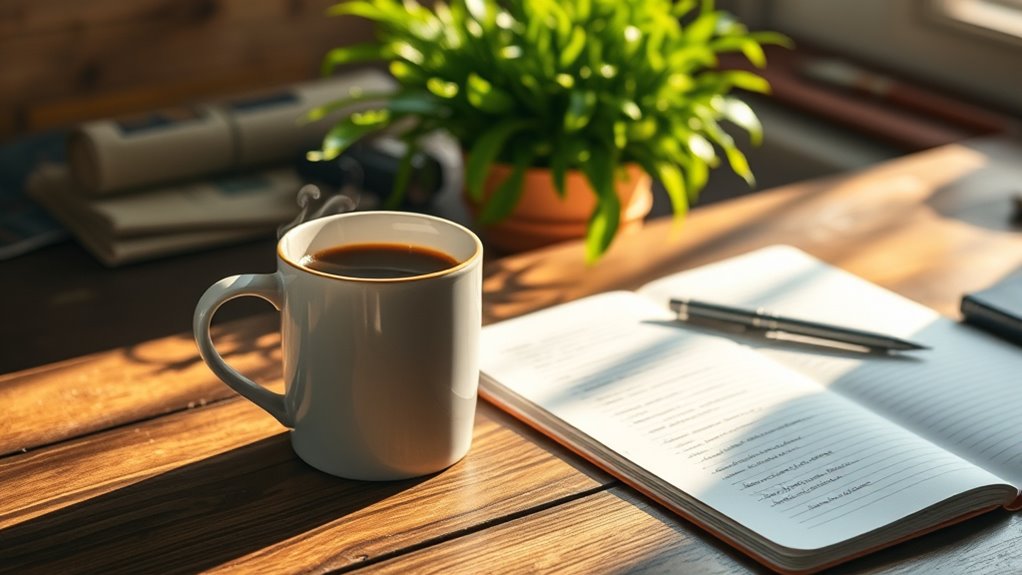Choosing decaf in the afternoon helps you stay productive without risking insomnia or caffeine crashes. It provides a calming, caffeine-free option that lets you unwind and focus while avoiding sleep disruptions. To boost energy naturally, consider light activity, hydrate well, and snack on protein-rich foods or herbal teas. Maintaining a balanced routine and managing stress also support sustained alertness. Keep exploring ways to enhance your afternoon productivity without caffeine, and you’ll find effective strategies that work for you.
Key Takeaways
- Opt for decaf or herbal teas to enjoy a warm, caffeine-free beverage that promotes relaxation without disrupting sleep.
- Incorporate light physical activity and hydration to boost energy naturally during the afternoon.
- Snack on protein-rich foods like nuts or yogurt for sustained alertness without caffeine.
- Manage stress through mindfulness or deep breathing exercises to improve focus and productivity.
- Maintain a consistent sleep schedule and avoid late-day caffeine to prevent insomnia and support overall energy levels.

There’s something uniquely soothing about sipping decaf in the afternoon, especially when you want to unwind without the jitters of caffeine. It’s a moment to slow down, savor your drink, and enjoy a brief respite from the busy day. But if you’re concerned about losing your afternoon energy, you might wonder if decaf can truly keep you productive. The good news is, you don’t have to rely solely on caffeine to stay alert. There are plenty of caffeine alternatives that can boost your energy levels naturally, so you can finish your tasks without sacrificing your sleep later.
One effective approach is to incorporate light physical activity into your routine. A quick walk around the block or some stretching can increase blood flow and oxygen to your brain, helping you feel more awake and focused. This kind of movement can be especially beneficial if you’re feeling sluggish after lunch. Hydration also plays a key role; drinking a glass of water can combat fatigue caused by dehydration, which often mimics tiredness. Sometimes, a simple sip of water is enough to re-energize your mind, making it easier to concentrate on your work.
Eating a nutritious snack can also provide a natural energy boost. Opt for foods rich in protein or healthy fats, like nuts, yogurt, or a piece of fruit with nut butter. These give your body sustained energy without the sugar crashes associated with processed snacks or sugary drinks. If you want something warm and comforting, herbal teas such as peppermint or ginger can be invigorating without caffeine. They can make your afternoon feel more revitalizing and help you stay attentive. Additionally, incorporating hydration strategies like electrolyte drinks or herbal infusions can further support your energy levels during the day.
Furthermore, maintaining a regular sleep schedule and managing stress levels contribute considerably to your overall afternoon energy. When you’re well-rested and less anxious, you naturally feel more alert and engaged throughout the day. If you’re seeking alternatives to coffee, consider practicing mindfulness or deep breathing exercises during breaks. These techniques can clear your mind and restore focus, keeping you productive without the need for stimulants.
In essence, you don’t have to depend solely on caffeine or coffee to power through your afternoon. By exploring these natural methods and caffeine alternatives, you can sustain your energy levels, enjoy your decaf, and avoid the insomnia that often comes with late-day caffeine consumption. Staying productive is about more than just the drink in your hand; it’s about creating a balanced routine that nurtures your body and mind.
Frequently Asked Questions
Can Decaf Coffee Still Cause Sleep Disturbances?
Decaf misconceptions often suggest it’s completely caffeine-free, but it can still cause sleep disturbances for some. Since decaf contains trace amounts of caffeine, your body might react, especially if you’re sensitive. Additionally, caffeine withdrawal from regular coffee can trigger sleep issues. If you notice trouble sleeping after drinking decaf, consider reducing intake further or switching to herbal tea. Your response varies based on your caffeine sensitivity.
What Are the Best Decaf Alternatives for Afternoon Energy?
Think of your afternoon energy as a garden that needs gentle watering. You might try herbal infusions like peppermint or chamomile for a calming boost, or energizing smoothies packed with fruits and greens. These alternatives provide natural vigor without the jitters or insomnia, helping you stay productive. Just like a well-tended garden, your energy levels flourish best with mindful choices—so explore herbal infusions and energy smoothies for a balanced afternoon lift.
How Does Decaf Affect Hydration Levels During the Day?
Decaf generally has a minimal hydration impact because it contains much less caffeine than regular coffee. Caffeine can act as a diuretic, potentially affecting your fluid balance if consumed in large amounts, but decaf’s lower caffeine levels mean it’s less likely to cause dehydration. So, when you drink decaf, you support your hydration levels and maintain fluid balance, helping you stay energized without risking dehydration during the day.
Are There Any Health Risks Associated With Decaf Coffee?
You might wonder about the health benefits and potential risks of decaf coffee. While decaf offers antioxidants and reduces caffeine-related issues, it isn’t risk-free. Some concern exists about residual chemicals from decaffeination processes and possible effects on digestion. However, for most, decaf is a safe choice that can boost health without the jitters. Always consider your individual health and consult a professional if unsure about decaf’s impact on you.
How Long Does Decaf Caffeine Stay in Your System?
When you ask how long decaf caffeine stays in your system, it’s all about caffeine metabolism and decaf absorption. Usually, decaf contains small amounts of caffeine, which you absorb quickly. It generally takes about 3 to 7 hours for your body to eliminate half of it, but complete clearance can take up to 10 hours. Your metabolism speed influences this process, so individual differences matter.
Conclusion
Switching to decaf in the afternoon can help you stay productive without sacrificing your sleep. It’s a simple change that makes a big difference in your energy levels and overall well-being. So, why risk sleepless nights just for a quick boost? Embrace decaf and enjoy your afternoons with clarity and peace of mind. Isn’t a good night’s sleep worth it? Take control of your afternoons and wake up refreshed every day.









